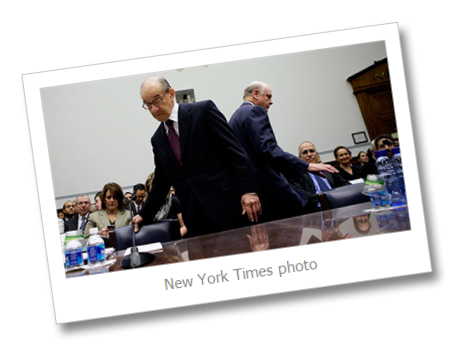

How are the Easter Bunny and the Invisible Hand alike?
Neither one exists!
Before we get into that though, here’s my hymn to the Invisible Hand, written in 2006, sung to the tune of Immortal, Invisible God Only Wise:
Immortal, Invisible Hand only wise,
Be careful, however, it’ll poke out your eyes.
Its origin Scottish, a myth from the moors,
It mostly appeals to the pikers and the boors.
Unthinking, uncaring, and cold as a fish,
Nor gen’rous, nor sharing, a total knish.
Its logic, all simple, its surface appeal,
Will make some scrubs think that it’s the real deal.
All laud they would render; O dear sweaty Hand,
E’en as You turn earth ‘to a No Man’s Land.
The Hand gives a dope slap as it bids us goodbye,
Then gives us the Finger, and a poke in the eye.
Here’s Joseph Stiglitz in 2003:
This year’s Nobel Prize celebrates a critique of simplistic market economics, just as last year’s award (of which I was one of the three winners) did. Last year’s laureates emphasised [the column by Stiglitz is in a British newspaper] that different market participants have different (and imperfect) information, and these asymmetries in information have a profound impact on how an economy functions.
In particular, last year’s laureates implied that markets were not, in general, efficient; that there was an important role for government to play. Adam Smith’s invisible hand – the idea that free markets lead to efficiency as if guided by unseen forces – is invisible, at least in part, because it is not there. [emphasis added]
Those of you who have taken any course in basic economics were undoubtedly told the very first day that humans are rational economic actors. If you went to St. Cloud State, you may have been told that by King Banaian himself.
The peudo-science of econometrics, of which Banaian is a practitioner, is based on it. But humans aren’t especially rational, and as Stiglitz observes, we possess vastly different information in making our economic decisions.
Stiglitz goes on to say in his article that rational expectation analysis obviously contributes a lot to our understanding of the economy, but that it is foolish to rely on it as the sole determinant and regulator of economic behavior.
We’ve come to some pretty spectacular grief over free market theology over the years, including recently.
From the Times article that included the photo:
Facing a firing line of questions from Washington lawmakers, Alan Greenspan, the former Federal Reserve chairman once considered the infallible maestro of the financial system, admitted on Thursday that he “made a mistake” in trusting that free markets could regulate themselves without government oversight.
The aforesaid King Banaian had the vapors, of course. He framed the question as one of who should protect the shareholders, the market or the regulators? Completely ignoring that there are other stakeholders: employees, counterparties, and the public.
To King Banaian’s shriveled Social Darwinist heart, nobody but the shareholders matter, but we’ve had four years to survey the wreckage of 2008 and Greenspan and others’ misplaced reliance on market forces alone.
This all came back to me recently when I watched an address by Professor (at Columbia) Stiglitz at the Roosevelt Institute. Stiglitz begins at about 8:00 minutes into the video.
But the astonishing thing — to me, and well, to Thomas Frank, too — is that fools like Banaian are not only unrepentant; they’ve doubled down on the bullshit. That, in a nutshell, is the thesis of Frank’s recent book, Pity the Billionaire.
Banaian the Lapdog is explained at least in part by his $50 ALEC membership and the access it gives him to periodic bacchanals put on by ALEC’s true sugar daddies like the Koch brothers.
But pity the soul than can be bought for a couple of shrimp cocktails and a drink with a paper umbrella in it. For guys like the Draz, it is probably about that simple. But for Banaian, it is almost certainly more: a difficulty in acknowledging that everything you believed about how the world works, and all the theses of the stuffy academic suff you wrote, was utterly, and unalterably, wrong.
Thanks for your feedback. If we like what you have to say, it may appear in a future post of reader reactions.



